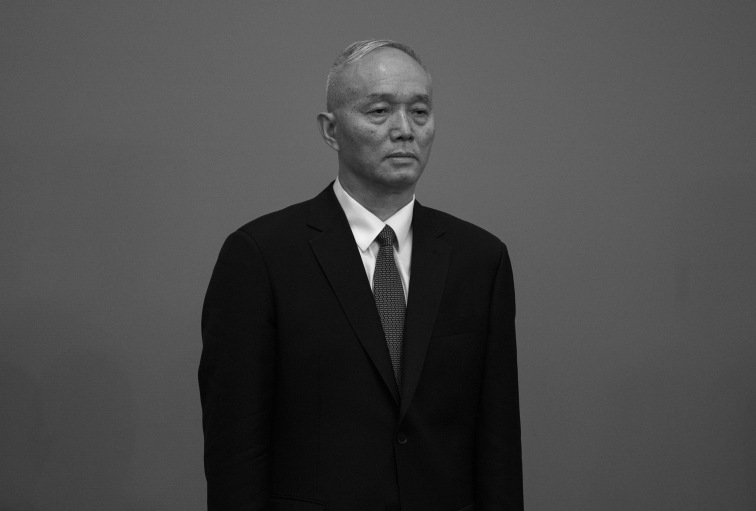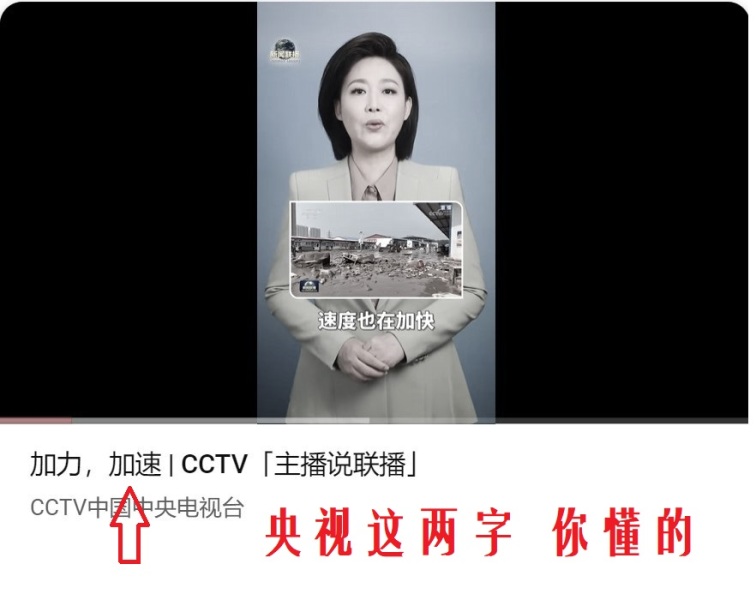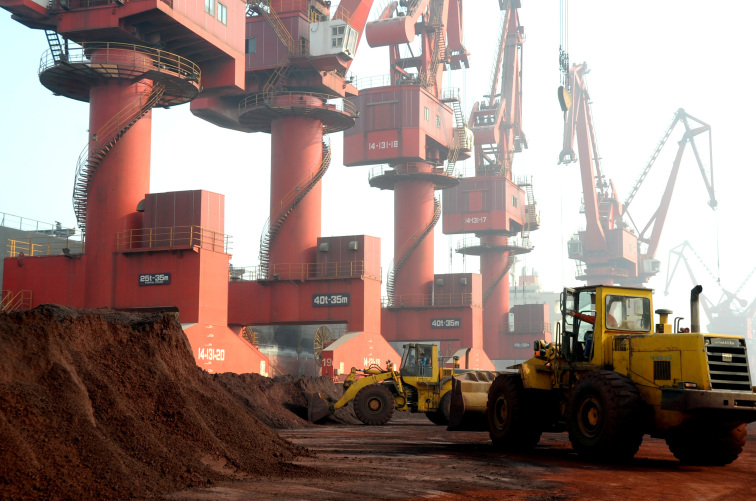On March 4, 2024, during the establishment of the military and armed police delegation at the Chinese Communist Party's two sessions, He Weidong (left) and Miao Hua (right) were seated at the praesidium. (Video screenshot)
[People News] Miao Hua and He Weidong have illegally formed Xi Jinping's private armed forces.
Cai Xia, a former professor at the Central Party School and a seasoned expert familiar with the internal workings of the Chinese Communist Party, disclosed a shocking insider story to the public for the first time during the "Fangfei Time" program on October 25, 2025. She revealed that Miao Hua and He Weidong secretly established a fully independent armed force at the deputy division level in the Langfang area of Hebei, completely outside of any existing war zones, military districts, and the conventional military system. Notably, the equipment of this force meets the standards of a deputy army level, creating a typical low-level high-configuration model, which indicates that it has received support significantly exceeding its nominal level in terms of resource allocation.
The command structure of this force is highly unusual, as it only takes orders directly from Miao Hua and He Weidong, without any involvement or interference from other military organisations. Professor Cai Xia stressed that she had been aware of this information through various channels within the system for a long time, but had refrained from disclosing any details to the public out of caution. She further analysed that the purpose of forming this force is clear; it serves as a private armed force specifically designed for Xi Jinping by Miao Hua and He Weidong, effectively functioning as Xi Jinping's "private army." Its location in Langfang was chosen due to its proximity to Beijing, allowing for rapid mobilisation at critical moments to provide close protection and support for Xi Jinping whenever necessary.
Professor Cai Xia's background enhances the credibility of her disclosures: she comes from a 'red second generation' family within the system, received rigorous training in the Chinese Communist Party (CCP) military during her early years, and later taught at the Central Party School for several decades, specialising in party history. She is widely recognised as an expert on CCP issues, with a deep understanding of the internal workings of the CCP system, the dynamics of the officialdom, and the nuances of power struggles. Importantly, she has built a substantial network of connections within the system, enabling her to access sensitive information from high-level insiders. Coupled with the various rumours circulating online regarding General Miao Hua, General He Weidong, and seven other generals' alleged plans to unseat Zhang Youxia, Professor Cai's information is credible and not unfounded. By following this line of reasoning, one can reasonably interpret the intricate power struggles currently unfolding within the CCP, aiding in the clarification of elusive clues and the motivations behind them.
The Paradox of Xi Jinping's Stable Power
If Xi Jinping truly wields absolute power, firmly controls the military, has the final say, and is seen as the sole authority, as rumoured, then why would he need to allow Miao Hua and He Weidong to secretly establish an independent armed force? This seems entirely unnecessary. The current military security system is already extensive and comprehensive: the Central Security Bureau is responsible for the personal security of key leaders, the Beijing Garrison Command oversees the defence of the capital, and the Central Special Operations Bureau manages special missions. Additionally, there are all the theatre commands, military districts, armed police forces, and various industry-specific armed police units, all of which are under Xi Jinping's control. His rule has effectively reached the level of a family dynasty, echoing the saying, 'Under heaven, all land belongs to the king; on the shores of the land, all subjects belong to the king.'
In this context, it is truly unfathomable to create an illegal, independent armed force that operates outside the regular system. Even more perplexing is the question of why this force, once established, needs to be completely dismantled in subsequent actions. If Miao Hua (苗華), He Weidong (何衞東), and others are seen as targets of Xi Jinping's purge in the list of nine generals announced on October 17, 2025, it is important to highlight that both Miao Hua and He Weidong were elevated to high-ranking positions in the Military Commission by Xi Jinping himself. They are part of the 'Xi family army' faction within the 31st Group Army, and there appears to be no logical reason for them to form a private armed force to oppose Xi Jinping. After all, at that time, Xi Jinping's main targets were the Rocket Force system and individuals like Li Shangfu (李尚福), who were associated with the Zhang Youxia (張又俠) faction. Why would Miao Hua and He Weidong suddenly resort to armed rebellion against Xi? This scenario is entirely illogical and cannot be justified.
Given that these actions are attributed to Xi Jinping's characteristic dictatorial mindset and a tendency towards terror, one would expect that after the removal of Miao Hua, He Weidong, He Hongjun (何宏軍), and others, there would be a timely and high-profile propaganda campaign to serve as a warning to deter other potential dissenters. This would align with Xi Jinping's goal of establishing authority and conducting purges through fear. Reflecting on history, during Mao Zedong's (毛澤東) rectification movement in Yan'an and the Cultural Revolution, the purges were so extensive that they turned society upside down, with big-character posters and loudspeaker broadcasts everywhere, mobilising mass movements to amplify the impact.
If Xi Jinping intends to clean up the ranks, he should at least instigate a significant upheaval within the military, prompting everyone from generals to soldiers to declare their positions, purge remnants, and completely eliminate any influences. However, the situation is quite the opposite: the Chinese Communist Party (CCP) authorities have been actively trying to cover up and handle the news about Miao Hua and He Weidong discreetly. This scandal was first reported by overseas self-media channels and was later reluctantly confirmed by a spokesperson from the Ministry of National Defence of the CCP military. Meanwhile, the party media have remained silent and avoided discussing the matter until Zhang Youxia's so-called 'palace coup' came to light on October 17, 2025. The unusual nature of this situation is intriguing and exposes the complexities of the power struggle.
Xi Jinping Faces the Consequences of His Actions
On July 21, 2025, the Central Military Commission's official newspaper, the "Liberation Army Daily," prominently featured a report on its front page, stating that the Central Military Commission had recently issued "Several Regulations on Vigorously Promoting Excellent Traditions, Completely Eliminating Toxic Influences, and Reshaping the Image and Authority of Political Cadres." However, the report was vague and unclear about the origins of the "toxic influences" that needed to be addressed. Can such an article genuinely assist Xi Jinping in establishing authority and consolidating military power?
This is certainly open to doubt. Reflecting on the early days of Xi Jinping's leadership, when he removed figures such as Guo Boxiong, Xu Caihou, Zhou Yongkang, and Bo Xilai, the official propaganda machinery was highly active, loudly publicising and dramatising their crimes, which created significant public pressure. Mao Zedong's purges of Peng Dehuai and Lin Biao in the military were even more intense, resembling a typical Cultural Revolution movement. In contemporary terms, both Peng Dehuai and Lin Biao had serious ideological conflicts with Mao Zedong. Peng Dehuai submitted a lengthy letter at the Lushan Conference, directly criticising Mao's policy errors, while Lin Biao orchestrated the "571 Project" to oppose Mao, posing a tangible political threat to him. They built their prestige within the Chinese Communist military through their own capabilities, holding political views that significantly diverged from those of Mao Zedong.
However, the current state of the Chinese Communist Party's military is significantly different. Miao Hua and He Weidong, among others, have ascended to power solely through loyalty displays, bribery, and flattery. They are completely aligned with Xi Jinping; without his favour and promotion, Miao Hua and He Weidong would not have reached the upper ranks of the Military Commission. Similarly, without Xi Jinping, how could Cai Qi and Li Qiang have possibly entered the Standing Committee? The idea that these individuals would oppose Xi, or even mount an armed rebellion against him, is entirely illogical and unfounded; there is simply no possibility of that occurring.
Moreover, if Miao Hua and He Weidong genuinely intended to oppose Xi, how could they completely overlook Zhang Youxia's presence? They should have considered allying with Zhang Youxia to have any chance of success. Instead, Miao Hua and He Weidong established Xi Jinping's private armed forces in Langfang, seemingly targeting Zhang Youxia's 82nd Group Army in Baoding, thereby creating a force to counterbalance him and ensure Xi Jinping's safety, while also looking for opportunities to eliminate Zhang Youxia. Unexpectedly, this plan backfired when Zhang Youxia used their own tactics against them, accusing them of rebellion. Xi Jinping was left with no choice but to swallow his grievances in silence, unable to publicly assert his position.
The deep-rooted crisis of factional splits within the Party and the potential for sudden shifts in the future political landscape.
During the Fourth Plenary Session, Zhang Shengmin, Secretary of the Military Discipline Commission, was promoted to Vice Chairman of the Military Commission. Ironically, he did not gain a seat in the Politburo, suggesting that Xi Jinping's decision was made out of necessity. Zhang Youxia's palace coup has succeeded, effectively diminishing Xi Jinping's military authority to zero. However, Xi Jinping still retains control over the party and government, and on the surface, all procedures appear to be legitimate. By preventing Zhang Shengmin from entering the Politburo, a certain balance is maintained.
The list of supplementary Central Committee members notably excluded military candidates, signalling a clear division between the party and the military. Following the Fourth Plenary Session, a peculiar situation has arisen within the Chinese Communist Party (CCP), where the party cannot command the military, and the military cannot command the party. The party's inability to command the military stems from Xi Jinping's loss of actual control over the armed forces; conversely, the military's inability to command the party is due to the elders and Zhang Youxia not fundamentally altering their approach to maintaining the CCP system. They continue to strive for the stability of the overall framework.
At the Fourth Plenary Session, Xi Jinping's three key positions remained unchanged, leading many to conclude that his power remains stable. Reports suggesting instability in Xi Jinping's power were dismissed as rumours, and the purges within the CCP military were interpreted as a Maoist or Stalinist-style great purge, reflecting the arbitrary nature of a dictator's power and a political display of authority.
At first glance, it appears to be this way, but the political ecology and logic of struggle within the dictatorial regime are far more complex than they seem. If the power struggle between Zhang Youxia and Xi Jinping were to be fully exposed, the existing organisational procedures and institutional authority of the Communist Party of China (CPC) would be completely dismantled. This would trigger a large-scale reaction both within and outside the CPC, signalling an imminent disintegration of the CPC system—a scenario that neither faction in the power struggle wants to confront.
Nevertheless, the so-called combative nature of the CPC represents a deadlock that the party cannot overcome. The power struggle involving the elders, Zhang Youxia, and Xi Jinping is irreconcilable; it is a fight to the death. Faced with the choice between preserving the party and saving their own lives, each individual understands that their own survival comes first; otherwise, what is the point of preserving the party?! When the intensity of the struggle for interests between the two sides disrupts the existing balance of compromise, and when the current organisational procedures and institutional structures fail to maintain a balance of terror, sudden changes will occur. However, this process is more likely to unfold gradually, accumulating until it reaches a critical tipping point.
(First published by People News)△











News magazine bootstrap themes!
I like this themes, fast loading and look profesional
Thank you Carlos!
You're welcome!
Please support me with give positive rating!
Yes Sure!